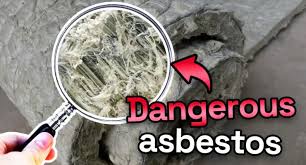Asbestos is a naturally occurring mineral once celebrated for its durability, heat resistance, and versatility in various industrial applications. However, this seemingly miraculous material poses severe health risks, making it one of the most dangerous substances in modern history. In Kenya and globally, the dangers of asbestos are increasingly being recognized, leading to bans and strict regulations to protect citizens.
This ban and related regulations are part of Kenya's broader commitment to safeguarding public health and the environment. However, enforcement remains a challenge, and public awareness is crucial to complement government efforts.
Dangers of Asbestos Exposure
Asbestos is dangerous because its fibers, when disturbed, can become airborne and easily inhaled. These microscopic fibers can lodge in the lungs and other parts of the respiratory system, leading to serious health complications, such as:
- Asbestosis: A chronic lung disease caused by scarring from inhaled asbestos fibers, leading to severe breathing difficulties.
- Mesothelioma: A rare and aggressive cancer that primarily affects the lining of the lungs, chest cavity, or abdomen. This condition is almost exclusively linked to asbestos exposure.
- Lung Cancer: Prolonged asbestos exposure significantly increases the risk of developing lung cancer.
- Other Cancers: Asbestos exposure has also been linked to cancers of the larynx and ovaries.
These health conditions can take decades to manifest, making asbestos exposure particularly insidious.
Products Made from Asbestos
Historically, asbestos has been used in numerous products due to its fire-resistant and insulating properties. Some common products that may contain asbestos include:
- Roofing materials: Corrugated sheets, shingles, and tiles.
- Ceiling and floor tiles: Especially older vinyl or linoleum tiles.
- Insulation materials: Used in walls, pipes, and boilers.
- Brake pads and clutches: In older vehicles.
- Cement products: Asbestos cement pipes and boards.
- Fireproof fabrics: Blankets and curtains designed for industrial use.
If you own or work around older structures, it's essential to be cautious as they may still contain asbestos.
Protecting Yourself and Your Community
To minimize the risks associated with asbestos, here are some practical steps:
- Identify Asbestos: If you suspect your home, workplace, or school contains asbestos products, consult with a certified professional to confirm.
- Avoid Disturbing Asbestos: Do not drill, cut, or sand materials that may contain asbestos, as this can release harmful fibers into the air.
- Professional Removal: Hire licensed asbestos removal experts for safe disposal of asbestos-containing materials.
- Report Unsafe Practices: If you observe unsafe handling or disposal of asbestos, report it to the relevant authorities, such as NEMA.
- Educate Others: Share knowledge about the dangers of asbestos with your family, neighbors, and colleagues.
A Call to Action
Asbestos exposure is preventable, yet its health consequences are irreversible. It is vital for everyone—citizens, businesses, and policymakers—to stay vigilant and proactive in managing the risks of asbestos. By adhering to regulations, practicing safe handling, and raising awareness, we can protect ourselves, our loved ones, and the environment from the silent dangers of asbestos.
Let us work together to ensure a safer, healthier Kenya free from the legacy of asbestos-related harm.


